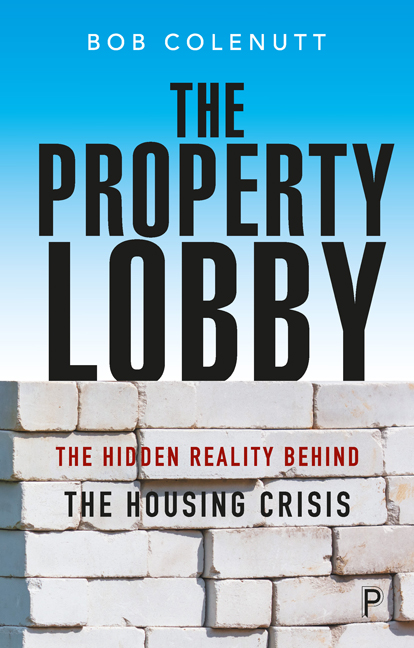Book contents
- Frontmatter
- Dedication
- Contents
- Acknowledgements
- Preface
- 1 The Finance–Housebuilding Complex
- 2 The Housing Shortage
- 3 The Housebuilding Business
- 4 Financing Housing Investment
- 5 The Property Lobby
- 6 Shaping National Housing and Planning Policy
- 7 The 2008 Financial Crash Continues
- 8 The Housebuilders and Affordable Housing
- 9 How the Social and Affordable Housing Sectors Got Swallowed
- 10 Local Case Studies
- 11 Unblocking the Impasse
- Postscript
- Notes
- References
- Index
1 - The Finance–Housebuilding Complex
Published online by Cambridge University Press: 10 March 2021
- Frontmatter
- Dedication
- Contents
- Acknowledgements
- Preface
- 1 The Finance–Housebuilding Complex
- 2 The Housing Shortage
- 3 The Housebuilding Business
- 4 Financing Housing Investment
- 5 The Property Lobby
- 6 Shaping National Housing and Planning Policy
- 7 The 2008 Financial Crash Continues
- 8 The Housebuilders and Affordable Housing
- 9 How the Social and Affordable Housing Sectors Got Swallowed
- 10 Local Case Studies
- 11 Unblocking the Impasse
- Postscript
- Notes
- References
- Index
Summary
Over decades, the UK housing crisis has persisted despite dozens of studies, government statements and community protests. Governments of all colours have announced new policies and interventions but nothing fundamental has changed. Despite intense campaigning by housing charities, and constituents queuing at the surgeries of Members of Parliament (MPs), there is an apparently unending housing shortage and a shocking lack of affordable and social homes. Experts tell us that we are short of 4 million homes, that thousands are homeless, that 1.2 million are on council waiting lists and that ‘one million private tenants are in deep poverty’ (Doward, 2018), but no effective action is taken. The housing crisis gets worse even as the number of think- tank reports, special commissions and select committees increases. Why is the housing system so impervious to change? What are the roadblocks?
In 1961, President Eisenhower talked of a ‘military– industrial complex’ to explain the power and interlocking nature of industry, finance and government in the military- related sectors of the economy. This book argues that at the root of the housing crisis, there is a ‘finance– housebuilding complex’ in the land and property market in the UK. It consists of close links between financial institutions, the government, political parties, landowners and developers. Increasingly, local authorities and housing associations are being drawn in. Government and the housebuilding industry have become interdependent. For both, they are mutually indispensable. This fatal embrace is the hidden reality behind the housing crisis.
The finance– housebuilding complex has immense power and patronage, which has grown remorselessly over the last 30 years. It is the major blockage to change. Yet, its composition, assumptions, working practices, lobbying and impact are largely unexamined and hidden from public scrutiny. By putting the finance– housebuilding complex and its lobbying power under the microscope, it is possible to reveal how reforms that would help to tackle the housing crisis have been blocked time and again – with the collusion of HM Treasury.
To understand the real challenge of the housing crisis, it is essential to examine the lobbyists, pressure groups and political forces inside and outside Whitehall that make up this complex of power. Equally importantly, we need to take a close look at the key policy issues on which it lobbies, and why the government has been so amenable to this lobby.
- Type
- Chapter
- Information
- The Property LobbyThe Hidden Reality behind the Housing Crisis, pp. 1 - 12Publisher: Bristol University PressPrint publication year: 2020

